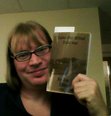Rachel Eliason's Blog
September 29, 2023
A New Cover for Run, Clarissa, Run

It’s been more than ten years since I first published Run, Clarissa, Run. A lot has changed since then, with me and with the world. So I decided it was time to re-edit the book, get a new cover, and…
Well, we’ll see.
Where I’ve been latelyWhen I published the book, I had big dreams of being a professional author. That didn’t quite pan out.
At first, it sold reasonably well. According to many blogs and forums of the time, each book would sell that much better and your author career was just a matter of hard work and continuing to write.
But, like a lot of authors from that time, I soon learned that wasn’t always the case. The next book sold slightly less, and the one after selling even fewer.
That’s not to say I haven’t had some success. I’ve sold thousands of copies in total. I’ve gotten some great reviews. I’ve met some of my readers and loved the experience.
But at the time my definition of “making” it as an author meant earning enough to quit my job and become a full-time author. And I never got close to that.
I kept writing. I started blogs. I wrote newsletters. I paid editors to improve my books, graphic artists for cover art, and promotional companies to help sell my books.
But eventually, I hit a wall, mentally. The amount of time I was putting into writing was leading me to burn out. The amount I was spending on various author services never equaled the amount of sales I was getting, making writing a very expensive hobby for a couple of years. Finally, watching my sales data, follower numbers, etc. was hurting my mental health.
I had to stop. I took a six-month sabbatical from writing, which turned into several years of not writing. I focussed on other things, like learning Esperanto, Portuguese and Spanish. I stopped being a nurse and started teaching English online. I emigrated overseas. It’s been a busy time, to say the least.
What’s comingBut now, I’m back. This time writing is definitely a hobby. I have a lot of other things that I want to do and I can’t spend nearly as much time. Nor can I afford to put out new books at the rate that I was publishing (4 per year).
I’m starting by reworking some of my old books. I’ve been using technology, like Grammarly, to root out the remaining typos and grammar errors that still plague some of these books, despite multiple rounds of editing. I’m also considering new covers if I can either, 1)make a decent cover myself or 2) find something better that isn’t too expensive.
I recently read the book Atomic Habits by James Clear. If you aren’t familiar with the book, I highly recommend it. The TL: DR is that making tiny (aka atomic level) changes over a long period of time can lead to amazing results.
He gives the example of the British cycling team, which had a long losing streak when David Brailsford took over. Instead of focusing on “winning more races” which is a vague and hard-to-achieve goal, he went around the edges, looking for small changes they could make. They tested new equipment, new training schedules, and new strategies. If they could find a shifter that was slightly better than another brand, they started using it. If a different tire type was a millisecond faster, that was enough for them to switch. Over time they started winning more and more.
And so that’s what I hope to do now. I hope that my latest round of edits is making my books one percent better. I hope the new covers are a tiny bit more catchy. Eventually, I hope to slowly resurrect my writing career.
The new Run, Clarissa, Run
I’ve started at the beginning, with my first book. I’ve re-read it, and I have found that overall it holds up pretty well. (In my opinion anyway.)
I made some edits and changed some of the language. The tech stuff is hopelessly outdated, but that’s okay. It’s true to its time period.
The ideas around gender are interesting. I said before that the book wasn’t autobiographic but it was cathartic. What I meant to say was that much of what I wrote about how the locals in the small town acted and reacted to Clarissa, were ideas and biases that I remember from growing up in a small town in Iowa in the 1970s and 1980s. I experienced a lot of the kinds of bullying that the character Clarissa, experiences.
When I wrote the book in the 2000s and published it in the early 2010s, I worried that much of that was outdated. Sadly, since the Trump era and the MAGA movement, the old outdated gender views seem to have made a comeback, and much of the discrimination that Clarissa faced remains all too topical.
So, in the end, I’ve kept the book mostly as is, minus a few errors and with some better formatting.
You can check out the new Run, Clarissa, Run on Amazon now.
The post A New Cover for Run, Clarissa, Run appeared first on Racheleliason.July 17, 2022
New Blog
This site crashed recently and I wasn’t able to get it back. So after several frustrating days of troubleshooting, I decided to start over. It’s time anyway. My life has changed so much in the last few years.
This will now be my personal page and devoted to a wide range of things that I do, with links to other pages as appropriate.
So who am I? I am a creative person with too much ADHD to be just one thing. I’m a writer, both creative and freelance. I am a language lover and learner. I am not a graphic designer, but I spend way too much time geeking around on Adobe software and I can handle most small jobs, so I can be a low price alternative to a designer for book formatting, photo touch ups, video editing, etc.
The post New Blog appeared first on Racheleliason.Hello world!
Welcome to WordPress. This is your first post. Edit or delete it, then start writing!
The post Hello world! appeared first on Racheleliason.
May 26, 2019
Des Moines Mountain Lion Spotted at Local Gay Bar
 Des Moines Mountain Lion Spotted outside local gay bar
Des Moines Mountain Lion Spotted outside local gay barWildlife experts say that it is not uncommon for LGBT identified wildlife to be found close to or inside of city limits in late May and early June. The lion, a DNR spokesperson claims, is probably just looking for a calendar of pride events.
Bears, otters and a variety of wild cats may be found in some LGBT friendly spaces year round but it is rare for straight people to notice this outside of Pride season, when their numbers grow larger and their visibility greater.
LGBT wildlife is generally safe so long as you give them the same respect that you give LGBT humans and respect their right to live their lives in peace. Call them by their preferred pronouns. Don’t harass or berate them publicly. Don’t threaten them with violence.
“What if I don’t treat LGBT humans with respect?” One lady asked the DNR at a public hearing. “I frequently misgender transgender people to let them know that I know. And I can’t help but comment when I see a gay couple showing any affection in public. What should I do?”
“LGBT humans find such behavior offensive,” the DNR spokesman replied, “but rarely resort to violence. A mountain can rip your face off, so…” He shrugged helplessly, “I guess stay home, Karen.”
Local LGBT activists say that are happy that the mountain lion is interested in their community and that they strive to be inclusive for everyone. “But if it just wants to know the pride schedule, that is available online.” Check out Capital City Pride for details.
October 14, 2017
The Agony, The Ecstasy and the Buddha
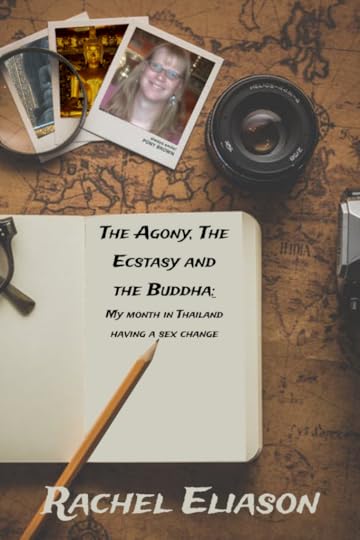
In early 2010, Rachel had transitioned to living full time as a woman for two years. She loved her new life and was happier than she had ever been, except for one small thing. And that was correctable. So she packed her bags and went to Bangkok, Thailand for SRS (sexual reassignment surgery).
Part travelogue and part memoir, The Agony, The Ecstasy and the Buddha is a month long journey to Thailand, and an intimate look at what it means to have sexual reassignment surgery in a foreign country.
It’s out Now!
Get the Ebook on Amazon.
Or the print book from Createspace.
.
Note: For the time period its exclusive on Amazon. If you read on other platforms let me know, I will eventually take it out of exclusivity and publish elsewhere, depending on demand. Thanks
September 2, 2017
Memoir Cover Help, Please Vote
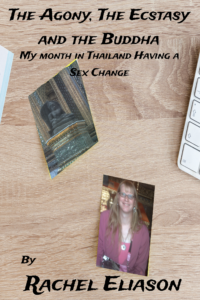 Cover One
Cover One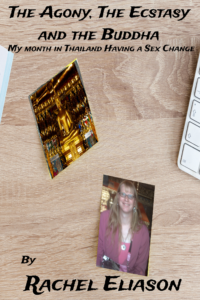 Cover 2
Cover 2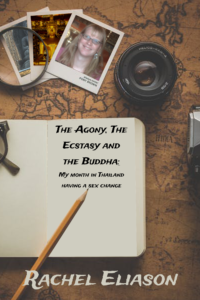 Cover Three
Cover Three
Note: There is a poll embedded within this post, please visit the site to participate in this post's poll.
If you need a reminder about the book, the blurb:
Rachel started attending a transgender support group in 2007, coming out to family and friends, started on hormones and had her name legally changed.
By the time this story begins, in early 2010, she had been living full time as a woman for nearly two years. She was happier than she had ever been, except for one small part. And that was correctable.
Join Rachel for a month long trip to Thailand, and for an intimate look at what it means to have sexual reassignment surgery.
June 16, 2017
The Case of Nikki Pagan Audio Book is on the Way!
Great news!
The Case of Nikki Pagan has a narrator and will be out in audio format in a matter of weeks.
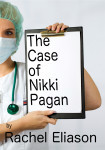
After the Jaws of Life tear Jason from the wreckage of his drunk-driving accident, he finds himself on the long-term pediatric ward, wondering if he will ever walk again.
Bobby only wants one thing out of life, to be a normal teen with normal friends. But when as the last-possible round of chemo fails to stem the spread of the tumors ravaging your body’s soft tissue, it’s hard to be normal.
Nikki is the glue that holds the two boys together. She is a bright and precocious fifteen-year-old girl. But why is she on the long-term ward? Why won’t she talk about what is wrong with her? Jason finds himself drawn into the mystery that is Nikki Pagan.
Want a free copy of the book? Want to hear when the audio is released? You can accomplish both by signing up for my newsletter today!
Email address:
First Name
Add me to R. J. Eliason's list? (Sci-fi/Fantasy)
No
Yes
May 28, 2017
Shoshone Station #5: Adam Out Now!
I was starting to worry I wouldn’t get it done this month, but here is the next installment in the Shoshone Station Serial adventure.
[image error]
It’s Lannister’s first Christmas on the station. For once he has the room and time to play host to for the family Christmas celebration. His plans are complicated by the arrival of his run away niece, now an out trans man.
The arrival of a human woman with a squid child places Zeta is an awkward place. Her job demands she investigates, but how can she put another person through the same hell she grew up with? And what if she refuses?
Buy it now!
To stay up to date on all of R. J. Eliason’s releases, sign up for her email list and get a free book:
Email AddressFirst NameLast NamePreferred formatHTMLTextMobile
May 25, 2017
Esperanto 2: What’s the little Idea, or Why Should I Learn Esperanto?
In the last post we discussed what Esperanto is and hopes to achieve. I call this the Big Idea. Today I would like to present the Little Idea, why you should learn Esperanto even though the Big Idea is still far in the future.
Why should you learn Esperanto?
[image error]
The Flag of Esperanto
Number One: You want to learn a second language but it’s hard. So learn an easy one.
You are right on both counts.
Numerous surveys show that people wish they were bilingual. But there is a better reason to learn a second language than just desire. Being bilingual has health benefits. That’s right, learning a second language has proven physical and mental benefits.
But it’s hard. Even a relatively easy language (like Spanish) takes a couple of years of consistent study to reach any degree of fluency in it.
Meanwhile the time to master Esperanto can be measured in months or even weeks. It’s still a lot of work, but far more manageable for the average person. Some of this is due to Esperanto’s simplified and regular grammar. Some of it is due to its unique way of using prefixes and suffixes to create a huge vocabulary out of a relatively small number of root words. Finally, Esperanto draws most of its words from common European languages, so English speakers will find a lot of similar words.
Number Two: There is a secret to learning languages (but it’s ridiculous).
So here’s something interesting. Learning a second language is a very difficult proposition. But learning a third is, interestingly, easier than learning a second. Learning a second language teaches you, and your brain, how to learn language.
Once you’ve learned a second language you know what it takes. You know what you are getting into starting in on a third. Realistic expectations help keep you motivated because you don’t give up as easily.
But it’s more than that. Many of the health benefits of being bilingual are because your brain has to develop to accommodate the second language. It has to learn how to keep those two languages separate but accessible. Once it knows how to do that, the third language comes easier.
So if you want to learn Japanese, why not learn Russian first? After you’ve spent, on average, five years learning Russian Japanese will be that much easier.
Of course that is ridiculous.
But there is one example that isn’t ridiculous, Esperanto. A famous and often quoted study went like this. British primary school students were divided into two groups. One was given two years of French. The other was given a year of Esperanto followed by a year of French. At the end of two years, the Esperanto speakers were better at French.
Why is that? In part because of the bilingual effect, their brains had mastered holding multiple languages. In part because of Esperanto’s simplified grammar. Researchers compare it to giving children a recorder before teaching them another instrument. You learn to read music on a simple instrument and when you take on a difficult language you have that part of the task down.
Esperanto’s grammar works the same way, it teaches you how languages are supposed to work. Natural languages are messier, filled with exceptions to every rule. But memorizing the exception is easier when you understand the underlying pattern.
So what are you waiting for? Get out and learn Esperanto.
Best of all you can learn for free. Duolingo, a free phone app has helped millions learn a new language. They offer a wide variety of languages, including Esperanto. The Universal Esperanto Association also has a learning website and app, both named Lernu. There are several books as well, if you prefer.
May 21, 2017
Esperanto: What’s the Big Idea behind the International Language?
Esperanto. What is it? Why am I learning it? Should you?
[image error]
The Flag of Esperanto
Esperanto is a planned language developed by an amateur linguist in 1887. His goal was to create an easy to learn, universal second language.
The creator, L.L. Zamenhof was not alone in wanting to do this. The idea of a universal second language has been studied by linguist for centuries, pushed by idealist and desired by travelers, business people and diplomats. What sets Zamenhof’s language, Esperanto, off from the others is that its’ survived over 130 years of history and continues to have a large body of speakers worldwide. It has grown beyond the idea phase into a living language.
When I think of Esperanto, I divide the reasons for it into two categories, the big ideas and the little ones. The big ideas are why Zamenhof wrote the language and why so many people have learned it over the years. The little ideas are why you my want to learn the language. So let us begin:
The big idea
The construction of an international language is driven by three main motivations, convenience, fairness and understanding. All three are prevalent in Esperanto.
Convenience
The convenience of a single universal second language should be obvious, travelers, business people, and diplomats would have a single language to learn, instead of hundreds. Journals and news could be published in Esperanto and be instantly accessible around the globe to speakers of many languages.
International news in Esperanto is already a thing. Here are a few sources.
To be truly convenient, this universal language must be simpler to learn than a natural language and Esperanto passes this test easily. Natural language learning is measured in years, Esperanto in months or in some cases weeks.
(Don’t be fooled by all the “learn Spanish in thirty days” courses out there. You might be able to have some really basic conversations at the end of that time, but real knowledge of Spanish takes on average two years of study.)
It’s fair.
But what does that have to do with fairness? Using any natural language as a second language, universal or otherwise, puts an enormous burden on nonnative speakers, who must spend years learning it. It also puts native speakers at a distinct advantage in any negotiations and just in life in general.
However if both parties learn the same second language, they have the same investment in time and are on much fairer footing with each other. If public services, like healthcare, government services, police, education, etc. are done in this universal language, all have equal access with our regard to linguistic abilities.
Understanding
Finally a universal second language could build a bridge between isolated linguistic communities. Eastern Europe of Zamenhof’s day was a mix of people who spoke different languages. His hometown of Bialystok was Polish, but filled with Russian, German and Jewish speakers.
In today’s world the problems are better in ways, worse in others. The internet and international news means that events are translated in a huge variety of languages in almost real time. But understanding often comes much slower. Facts translate easily, culture does not.
Just look at America’s convoluted relationship with the Middle East. The phrase “Allah Akbar” simple means “Praise be to God.” And yet images of Arabic men jumping up and down and yelling “Allah Akbar” have become iconic of radical terrorism and anti-American protests.
Many evangelic christian denominations say praise be to God. Many jump up and down and wave their hands during religious services.
What if both services appeared in the news with the caption “laudo estu al Dio?” (Esperanto for praise be to God) Would people realize those people over their aren’t doing anything that people over here do? Would it start to shift the narrative? I like to think so.
So Why Not?
Why aren’t we doing this?
The answers are many, and many are political. A lot of it comes down to two things, the myth that we already have a universal language and who that myth serves.
The myth is that we have a universal language: English. The reality is far different but I will address that in another blog, because it will take a lot of words.
Who benefits from this myth? Just about every English speaking country and many corporations. Both the US and the UK spend large sums of aid money on English education throughout the world because they know this is key to their national interests.
Africa is home to some of highest levels of language diversity on the globe. Thanks to a long history of colonialism, several of the commonly spoken languages that are used to bridge the gaps between linguistic groups are European languages, French, Portuguese and more recently English.
In modern times, American aid often comes with the English language. For example groups like the Peace Corp teaches practical agricultural skills but also sends many English teachers to impoverished areas. While the volunteers might be idealist, only wanting to help, those in Washington that pay for these programs often have a secondary motive, to keep Africa looking to the English speaking world for it’s future.
It is a great example of soft power, which are probably the future of global conflict. As a growing superpower and major oil importer, China would love to have a greater toe hold on African oil and mining wealth. How do they try to gain this foothold? In recent years Chinese foreign works have become vital to the industries in Africa. And Chinese language comes with them. As more and more Africans learn Chinese, they are more inclined to work with Chinese companies. And slowly the balance of power shifts.
Esperanto could serve to diffuse that conflict and reduce the soft power of corporations and governments alike. It would be a soft power revolution for Africans to have a unified second language that wasn’t beholden to any superpower. And that is the big idea of Esperanto.
Coming up next: The little idea. Or why you should learn Esperanto.
Convinced already? Check out Duolingo, the smartphone app that makes language learning easy.

